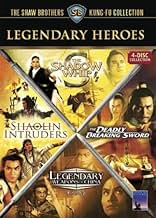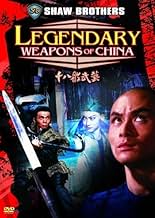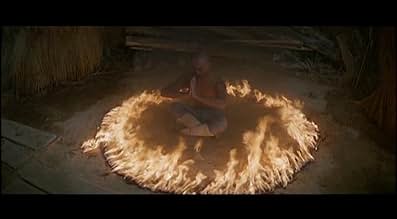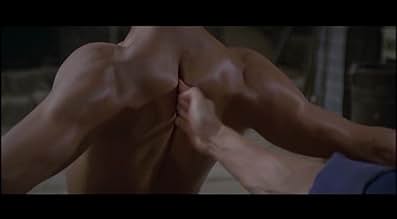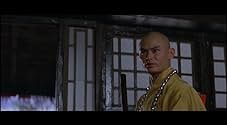A band of killers from an ailing kung fu and magic society are sent on a manhunt for a former member of the society, whose bad mouthing threatens its existence.A band of killers from an ailing kung fu and magic society are sent on a manhunt for a former member of the society, whose bad mouthing threatens its existence.A band of killers from an ailing kung fu and magic society are sent on a manhunt for a former member of the society, whose bad mouthing threatens its existence.
- Director
- Writers
- Stars
- Awards
- 1 nomination total
Liu Chia-Yung
- Lei Ying
- (as Chia-Yung Liu)
Kara Ying Hung Wai
- Fang Shao-Ching
- (as Kara Hui)
- Director
- Writers
- All cast & crew
- Production, box office & more at IMDbPro
Featured reviews
The Yi Ho Society wrongly think that their magic and pugilism skills will protect them from any weapon, including the guns used by the West. Lei Kung (Chia-Liang Liu) realises that this belief will only result in senseless bloodshed and attempts to dissolve the society to save lives. In doing so, he is branded a traitor and is hunted by several of Yi Ho's best fighters.
I love weapons work in kung fu films and Legendary Weapons of China naturally features lots of it, mostly in the second half; unfortunately, the movie also has rather a lot of comedy (in the first half), something that I always struggle with in kung fu films, making the film as a whole something of a mixed bag for me: desperately unfunny nonsense for the best part of an hour, but ending on a high with plenty of crazy fight action employing the eighteen main weapons of Chinese martial arts: rope dart, double tiger hook swords, double hammers, battle axe, snake halberd, kwan dao, twin broadswords, double-edged sword, Chinese spear, three-section chain whip, double daggers, double crutches, monk's spade, staff, tiger fork, rattan shield, single butterfly sword and three-section staff.
Also adding to the fun are the film's sillier weapons, including booby trapped capes and explosive darts, and some really daft moments, best bits being a bonkers fight in the rain and the unforgettable sight of two warriors mutilating themselves, the first poking his own eyes out and the other ripping his goolies off!
5.5 out of 10, rounded up to 6 for IMDb-not the classic of the genre that I had expected, but entertaining enough.
I love weapons work in kung fu films and Legendary Weapons of China naturally features lots of it, mostly in the second half; unfortunately, the movie also has rather a lot of comedy (in the first half), something that I always struggle with in kung fu films, making the film as a whole something of a mixed bag for me: desperately unfunny nonsense for the best part of an hour, but ending on a high with plenty of crazy fight action employing the eighteen main weapons of Chinese martial arts: rope dart, double tiger hook swords, double hammers, battle axe, snake halberd, kwan dao, twin broadswords, double-edged sword, Chinese spear, three-section chain whip, double daggers, double crutches, monk's spade, staff, tiger fork, rattan shield, single butterfly sword and three-section staff.
Also adding to the fun are the film's sillier weapons, including booby trapped capes and explosive darts, and some really daft moments, best bits being a bonkers fight in the rain and the unforgettable sight of two warriors mutilating themselves, the first poking his own eyes out and the other ripping his goolies off!
5.5 out of 10, rounded up to 6 for IMDb-not the classic of the genre that I had expected, but entertaining enough.
This is a great kung fu movie once you get the opening done with. The storyline is fairly confusing in the beginning, but that passes with time. The fight scenes are neat to watch, but they get exponentially better as time goes on. The fight with Gordon Liu (36th Chamber) is good and the final fight WAS FANTASTIC! This isn't a movie to sit down and watch for the stimulation. The character development isn't as good as FIVE VENOMS, or SWORDSMAN II, but it's fair. The weapons fighting is just unbelievable in the last fight scene. All in all, if you are a fan of kung-fu movies, get around to checking this one out. The three-section-staff work is even better than in 36th Chamber.
The last reviewer of this film missed the point. This film is excellent and the last 30 minutes contains some of the best martial arts action committed to film. Yes, the plot is ridiculous and the dubbing makes everyone sound like a porn star but you don't watch kung fu films for the acting skill and production values. You watch them for escapism and entertainment.
The story itself is about the rise of the gun in china and the director, who also stars, attempting to show how pointless it was to fight the evil of the gun.
Lei Kung is a martial arts master whose speciality is 'pugilism'(i suppose it was easier to dub that word than what the real skill is called), which is basically invulnerability to conventional weapons (swords, knives, blades etc). He decided to dissolve his sect within the school he taught in to protect his students. He was forced to do this as his superiors were ordering other sect to practice 'pugilism' with the proviso of ultimately being able to withstand bullets.
So now it is several years later, Lei Kung is hiding out as a woodcutter, and the bad guys send some martial arts experts to seek him out and kill him. At first we know of three: Ti Hau, the best student of a master who teaches partial invulnerability and techniques to confuse the enemy. Chao Ching, who is a woman, but who dresses as a man to mingle with the populace. She can see how attempting to overcome the gun with 'pugilism' is pointless and wants to join Lei Kung. Finally there is Ti Tan, another master 'pugilist'.
While they are searching another man whose name is not revealed is searching for Lei Kung. His skill seems to be based on hypnotism, and dolls. He hypnotises a person, then uses a doll to control their movements, thus having someone fight for him.
Ti Hau ends up getting ill whilst searching, but is saved be Lei Kung who nurses him back to help with Chau Ching's help. She convinces Lei Kung that she wants to help, but doubts if they can convince Ti Hau when he gets better. It does not matter ultimately, because the other mysterious fighter tracks Lei Kung down. They fight, but Lei kung is well out of practice and is defeated easily. But the mysterious bad guy is Lei Kung's brother, Lei Yung who explains that he was also given the order to kill but can't kill his own brother. He suggests that Lei Kung begins to proactive again to recover his strength and power. That way he can defend himself against other killers who are after him.
Hi trains hard, and starts to get his power back. But Ti Tan turns up and starts to kick off. Ti Hau tries to explain that Lei Kung is a woodcutter who only knows basic kung fu taught to him by Chau Ching. Ti Tan is not convinced and begins his attack. Chau ching defends but is no match, neither is Ti Hau. So it is time for Lei Kung o flex hi muscles. He fights and in doing so speeds up his strength recovery. He defeats Ti Tan, but in doing so let's it slip that he really is Lei kung. Ti Hau runs off, not knowing what to do, he has witnessed Lei Kungs far superior martial skill and is unsure of how to proceed. Ti Hau returns that night, using his skills he tries to convince Lei Kung and Chau Ching that he has gathered many men, but they are dummies and Lei Kung sees through the deception. But it is not Ti Hau but his master who is attacking. Another great fight scene follows with Ti Hau turning up half way through and his own teacher turning on him when he realises he cannot kill Lei Kung. In trying to kill his student, he shows Ti Hau that there is more to life than killing and his own life is worth something. This is the reason Lei Kung disbanded his school, to protect his students who he knew would die if they tried to withstand the gun. Lei Kung defeats Ti Haus' master who then tries to kill himself. Ti Hau stops him, and his teacher also sees that perhaps his way of life is wrong, and his pupil's lives are not expendable. He leaves suggesting Ti Hau remain to carry on training and learning with Lei Kung and Chau Ching. Lei Kung walks off and dusts off his 'holy robes' explaining that he has to go to the city temple to see his brother. He explains that his brother is not really going to let him walk away, but wanted him to train up and face him in a duel to the death. He takes his 2 new students with him, and then fights his brother using weapons combat in some of the most amazing choreography i have seen in a kung fu film. He defeats his brother who he then tells to go back and report that he killed him. His brother is left broken, finally realising that personal glory is no substitute for having a rich and meaningful life.
The story itself is about the rise of the gun in china and the director, who also stars, attempting to show how pointless it was to fight the evil of the gun.
Lei Kung is a martial arts master whose speciality is 'pugilism'(i suppose it was easier to dub that word than what the real skill is called), which is basically invulnerability to conventional weapons (swords, knives, blades etc). He decided to dissolve his sect within the school he taught in to protect his students. He was forced to do this as his superiors were ordering other sect to practice 'pugilism' with the proviso of ultimately being able to withstand bullets.
So now it is several years later, Lei Kung is hiding out as a woodcutter, and the bad guys send some martial arts experts to seek him out and kill him. At first we know of three: Ti Hau, the best student of a master who teaches partial invulnerability and techniques to confuse the enemy. Chao Ching, who is a woman, but who dresses as a man to mingle with the populace. She can see how attempting to overcome the gun with 'pugilism' is pointless and wants to join Lei Kung. Finally there is Ti Tan, another master 'pugilist'.
While they are searching another man whose name is not revealed is searching for Lei Kung. His skill seems to be based on hypnotism, and dolls. He hypnotises a person, then uses a doll to control their movements, thus having someone fight for him.
Ti Hau ends up getting ill whilst searching, but is saved be Lei Kung who nurses him back to help with Chau Ching's help. She convinces Lei Kung that she wants to help, but doubts if they can convince Ti Hau when he gets better. It does not matter ultimately, because the other mysterious fighter tracks Lei Kung down. They fight, but Lei kung is well out of practice and is defeated easily. But the mysterious bad guy is Lei Kung's brother, Lei Yung who explains that he was also given the order to kill but can't kill his own brother. He suggests that Lei Kung begins to proactive again to recover his strength and power. That way he can defend himself against other killers who are after him.
Hi trains hard, and starts to get his power back. But Ti Tan turns up and starts to kick off. Ti Hau tries to explain that Lei Kung is a woodcutter who only knows basic kung fu taught to him by Chau Ching. Ti Tan is not convinced and begins his attack. Chau ching defends but is no match, neither is Ti Hau. So it is time for Lei Kung o flex hi muscles. He fights and in doing so speeds up his strength recovery. He defeats Ti Tan, but in doing so let's it slip that he really is Lei kung. Ti Hau runs off, not knowing what to do, he has witnessed Lei Kungs far superior martial skill and is unsure of how to proceed. Ti Hau returns that night, using his skills he tries to convince Lei Kung and Chau Ching that he has gathered many men, but they are dummies and Lei Kung sees through the deception. But it is not Ti Hau but his master who is attacking. Another great fight scene follows with Ti Hau turning up half way through and his own teacher turning on him when he realises he cannot kill Lei Kung. In trying to kill his student, he shows Ti Hau that there is more to life than killing and his own life is worth something. This is the reason Lei Kung disbanded his school, to protect his students who he knew would die if they tried to withstand the gun. Lei Kung defeats Ti Haus' master who then tries to kill himself. Ti Hau stops him, and his teacher also sees that perhaps his way of life is wrong, and his pupil's lives are not expendable. He leaves suggesting Ti Hau remain to carry on training and learning with Lei Kung and Chau Ching. Lei Kung walks off and dusts off his 'holy robes' explaining that he has to go to the city temple to see his brother. He explains that his brother is not really going to let him walk away, but wanted him to train up and face him in a duel to the death. He takes his 2 new students with him, and then fights his brother using weapons combat in some of the most amazing choreography i have seen in a kung fu film. He defeats his brother who he then tells to go back and report that he killed him. His brother is left broken, finally realising that personal glory is no substitute for having a rich and meaningful life.
'Legendary Weapons Of China (1982)' is a little bit confusing at first, with a variety of gang factions all searching for a supposed traitor without actually knowing what he looks like. Because we also don't know who he is, it can be a bit difficult to discern who's who and who's lying about who they really are. It doesn't help that the true intentions of the various searchers aren't made clear until later on in the picture. After a while, though, everything sort of coalesces when the flick gives us some much-needed exposition as to what it's actually about. From then on, it's much easier to follow. Besides, the story itself isn't the main reason that anyone's watching this. That would be the immense fight sequences, of course, and none of them disappoint. The flick puts a lot of focus on three types of supernatural martial arts: magic, spiritual boxing and Maoshan. The first allows the user to conjure up a variety of secret weapons, teleport in balls of smoke and create decoys of themselves at a moment's notice; at its highest levels, it can be used to command others to do one's bidding. The second allows the user to withstand blows from bladed weaponry without so much as a scratch. The third makes use of voodoo-esque techniques to control other people, binding them to dolls which can be manipulated with twisting motions and pressure point manipulations. It's these three techniques that really marks the picture as something distinct from a lot of its peers, and it allows for some distinct choreography that constantly keeps the audience as on their toes as those involved in the battles themselves. Furthermore, the flick makes use of some confined spaces that necessitate further invention in terms of designing the bouts that take place within them. It's really fun to see people fighting in a cramped attic or tight alleyway, making use of their environment to avoid attacks both physical and otherworldly. It's a nice change from the genre's tendency to have its bouts take place in wide open arenas. Having said that, there are plenty of action scenes that take place in said spaces. They aren't any worse off for this, even if they are more traditional, mostly because their choreography is consistently phenomenal and their formal execution is consistently accomplished. That's what you'd expect from director Chia-Liang Liu, of course, but he cements his position as one of the greatest action directors of all time with each new film of his I see. Plus, he gets to really shine in front of the camera this time. Although he has cameos in a lot of his films, he's arguably the protagonist of this one and a lot of the set-pieces are focused almost entirely on him. The final duel is jaw-droppingly good, an intense one-on-one that makes use of 13 of the 18 eponymous legendary weapons (5 are used in an earlier sequence) and is reinvigorated each time the characters adopt a new fighting tool. It's fast-paced, exciting and unbelievably impressive. The same can be said of another stand-out set-piece, a hand-to-hand bout that features Gordon Liu in a rare villainous role and features some choreography I've never seen before (Liu makes use of his shoulder blades to fight facing backwards!). The third notable conflict occurs just after a hugely entertaining sequence of a charlatan conspiring with his gang to convince an entire town he's a famous Kung fu fighter, which sees the same conman unwittingly take on an opponent while he's under the influence of Maoshan folk magic. It's a genuinely funny scene that makes excellent use of slapstick comedy in combination with impressive athleticism, with Alexander Fu Sheng being tossed around like a ragdoll so convincingly you forget it's actually him doing all the flipping. The humour is present in a number of other scenes, too, which keeps things feeling suitably lighthearted even when people are fighting for their lives. Ultimately, although the plot is a little confusing to start with (and takes a while to properly get going), movie is a ton of fun when it's fully underway. The experience is a bit uneven, but - more often than not - it fires on all cylinders and its Kung fu is absolutely spectacular. It's a blast.
I think watching Shaw Brothers movies is a bit like doing martial arts; if you go a while without practice, you lose the progress and skills you built up. I went on a binge of the studio's movies early last year, then went away for a bit, and now I'm back, feeling out of shape and out of breath trying to keep up with Legendary Weapons of China.
It could be partly or wholly on me, but I'm also open to the idea that this one might just be a bit much. It throws many characters and concepts (voodoo, invulnerable warriors, mistaken identities, disguises, magic, etc) at you so quickly; I was confused from the start and just got more confused as I went on.
Now, a confusing plot hasn't got in the way of me really enjoying martial arts movies before, but I was also confused during various fight scenes in Legendary Weapons of China. It's hard to get a handle on how some of the fantasy elements work, and who has the power to do what, and with the usual fast pacing and feeling that everything is slightly sped up (not just in the fight scenes either, unusually; I think that added to the confusion for me), I couldn't keep up.
Now, if that's on me (and I'm sure at least some of it is), I can't call this terrible. There is at least the ability to admire its ambition and unique qualities, even if those things did make me lose track of the things I'd usually enjoy. And the final fight scene did redeem things in my eyes a little. It downplays the crazy magic stuff to mostly just be a one-on-one fight that goes on for a while and involves many different weapons, and it was easily the most impressive sequence from a stunt/choreography perspective.
This is the kind of film where anyone who can keep up is likely to have a blast, but for whatever reason, tonight, it was just a little too much too fast for me personally. Gotta get back to my Shaw Brothers training regime, maybe...
It could be partly or wholly on me, but I'm also open to the idea that this one might just be a bit much. It throws many characters and concepts (voodoo, invulnerable warriors, mistaken identities, disguises, magic, etc) at you so quickly; I was confused from the start and just got more confused as I went on.
Now, a confusing plot hasn't got in the way of me really enjoying martial arts movies before, but I was also confused during various fight scenes in Legendary Weapons of China. It's hard to get a handle on how some of the fantasy elements work, and who has the power to do what, and with the usual fast pacing and feeling that everything is slightly sped up (not just in the fight scenes either, unusually; I think that added to the confusion for me), I couldn't keep up.
Now, if that's on me (and I'm sure at least some of it is), I can't call this terrible. There is at least the ability to admire its ambition and unique qualities, even if those things did make me lose track of the things I'd usually enjoy. And the final fight scene did redeem things in my eyes a little. It downplays the crazy magic stuff to mostly just be a one-on-one fight that goes on for a while and involves many different weapons, and it was easily the most impressive sequence from a stunt/choreography perspective.
This is the kind of film where anyone who can keep up is likely to have a blast, but for whatever reason, tonight, it was just a little too much too fast for me personally. Gotta get back to my Shaw Brothers training regime, maybe...
Did you know
- TriviaChia-Liang Liu: [martial arts demonstration] Opening credits show a demonstration of martial arts against an empty backdrop.
- Alternate versionsThe 1987 UK video suffered extensive cuts of over 5 minutes and lost all footage of Japanese throwing stars and nunchaku used in the fight scenes.
- ConnectionsFeatured in Knockaround Guys (2001)
- How long is Legendary Weapons of China?Powered by Alexa
Details
- Release date
- Country of origin
- Languages
- Also known as
- Shi ba ban wu yi
- Production company
- See more company credits at IMDbPro
- Runtime
- 1h 49m(109 min)
- Sound mix
- Aspect ratio
- 2.35 : 1
Contribute to this page
Suggest an edit or add missing content



